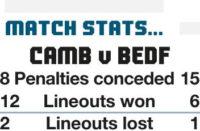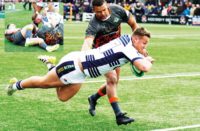 The RFU's Head of Elite Coach Development, Kevin Bowring, wants to see more English-qualified coaches follow Glenn Delaney's example and make the step up from the Championship to the Premiership.
The RFU's Head of Elite Coach Development, Kevin Bowring, wants to see more English-qualified coaches follow Glenn Delaney's example and make the step up from the Championship to the Premiership.
On July 1, the date he officially joins London Irish, Delaney will become the first lower level coach to have had his talent recognised at the elite end of the club game since Kingsley Jones left Doncaster for Sale seven years ago.
A Kiwi by birth, Delaney has spent the last decade in England and has contributed massively to the game in the country through his involvement with Nottingham and the Professional Game Board Development Group.
Delaney's sterling service to Nottingham as director of rugby since December 2005 has been rewarded with the job of coaching the forwards at London Irish, a role coveted by higher profile candidates with Premiership experience behind them such as Neil Back and Martin Haag.
“Traditionally the stepping stone to the Premiership has come from within a club through the academy, with coaches or managers like Toby Booth, Paul Hull, Neal Hatley all making the step up. So Glenn is breaking the mould in a sense and I am delighted for him,” Bowring told The Rugby Paper.
“I'm sure it may have been Kingsley's relationship with Philippe Saint-Andre that was part of the reason why he got the job at Sale, whereas Glenn's appointment is purely because of the good work he has been doing in the Championship.”
Bowring added: “In the Championship you have to do everything, because you don't have the coaching resource to delegate and you become totally rounded in what you do.
“Glenn is a very able, articulate and intelligent coach, who holds the top level coaching qualification in England, and I'm delighted that he's been given the opportunity to coach in the Premiership.
“I hope that more will follow him in the future.”
The signs look good, with a plethora of young, recently retired players – or those nearing the end of their careers – coming through the system.
The RFU's visionary approach to elite coach management, which first came to light when they hired former PE teacher Bowring a decade ago, has seen over 70 professional players fast-tracked to the Level 3 qualification – one below the top award – in the last five years.
As a result the likes of scrum-halves Mike Baxter and Paul Hodgson and former British Lion and England lock Danny Grewcock are already well down the increasingly rocky road of professional coaching.
Sustaining that career is a problem in itself, with the average life-span of coaches in the Premiership now fewer than two years, as the ‘hiring and firing' culture of football starts to become prevalent in rugby.
Getting an opportunity in the first place, though, is more than half the battle, with only a limited number of jobs to go round and overseas coaches often taking many vacancies that do arise.
Peter Russell's appointment as head coach of Newcastle, who were still anticipating being a Premiership club, is an example of a club overlooking English coaches for a largely unknown assistant Super 15 coach.
Worryingly, only a third of the top jobs in English rugby's two professional leagues are taken by Englishmen. Rob Baxter (Exeter), Richard Cockerill (Leicester), Jim Mallinder (Northampton) and Richard Hill (Worcester) currently fly the flag of St George in the Premiership, while Dean Richards has arrived as director of rugby at Newcastle but now looks like starting in the Championship.
However, 72 per cent of all coaches who work in the Premiership are English qualified and a good number have experience of international rugby at age-group or Saxons level.
In the Championship only Ben Harvey (Jersey), Diccon Edwards (Leeds) and Simon Amor (London Scottish) represent England, although again the latter two have been part of the Red Rose brigade through past involvement with England U20s and England Women's Sevens sides respectively.
Ironically, Welshman Bowring's countrymen fill six of the 23 posts currently filled in the professional club game, and the 58-year-old admits it would be desirable to have more English qualified coaches operating there.
With financial incentives handed out to the Premiership clubs for fielding a certain number of English qualified players it will be interesting to see if the same policy is to be applied on the coaching front in the near future.
“Our objective at the RFU is not necessarily to get 100 per cent English qualified coaches, because I think it's important to have some top quality coaches from other nations bringing in a different perspective to the benefit of the domestic game. But I believe that at least 70-80 per cent should be English qualified,” the former London Welsh flanker said.
“It is important that the overseas coach understands the culture and identity of the club and of the country he is working in. Having an English coach helps in that respect and while some overseas coaches embrace this approach others try to impose their country's culture and it rarely works.
“Like I said, it's not about having a blinkered approach; you need to be open to ideas from abroad. As long as the club knows what it wants and goes through the right process to find the right person then that's fine.
“Take Saracens and Harlequins, where you have got an experienced Irishman heading up the coaching teams, with a number of good, young, English qualified coaches working underneath them.
“Hopefully one day the likes of Alex Sanderson, Paul Gustard and Kevin Sorrell (Saracens) and Tony Diprose and Mark Mapletoft (Harlequins) will be trusted to be a head coach in their own right. They have great potential.
“In the meantime, though, they are getting valuable experience and learning all the time. I think a coach is better coach through experience – good and bad.”
Yet, when results go wrong, too often coaches are cast adrift. Bowring admits he is worried by the recent high turnover of coaches.
“It's a bit worrying,” he said. “It's easier to change one coach than 15 players if you haven't had a very good season, and that's what tends to happen.
“We're in a profession where the coach gets blamed for losing and the players get praised for winning, and that's how it should be.
“But we're too easy to hire and fire and blame the coach.
“Guy Noves' track record at Toulouse speaks volumes for continuity. And if you look at the top five in the Premiership season just gone there wasn't any coaching merry-go-round at Harlequins, Leicester, Saracens, Northampton or Exeter, it involved the sides below.
“At international level, New Zealand invested in Graham Henry after they were dumped out of Rugby World Cup 2007, and he used his experiences from that tournament to go on and win the trophy on home soil four years later. We often discard that learning by disposing of the coach too quickly.
“This is a pretty volatile business and I always tell professional players to carry on playing for as long as they can. Coaching is a poor substitute for playing, but it's the next best thing.”
THE UNITED NATIONS OF COACHING
The director of rugby/head coach make-up of the Premiership and Championship by country of birth/international team played for.
England (8): Premiership – Rob Baxter (Exeter), Richard Cockerill (Leicester), Jim Mallinder (Northampton), Richard Hill (Worcester).
Championship – Dean Richards (Newcastle), Ben Harvey (Jersey), Diccon Edwards (Leeds Carnegie), Simon Amor (London Scottish).
Wales (6): Premiership – Nigel Davies (Gloucester), Dai Young (Wasps, Lyn Jones (London Welsh).
Championship – Mike Rayer (Bedford), Ian Davies (Cornish Pirates), Brett Davey (Doncaster Knights).
Ireland (3): Premiership – Conor O'Shea (Harlequins), Mark McCall (Saracens).
Championship – Kevin Maggs (Moseley)
South Africa (2): Premiership – Gary Gold (Bath). Championship – Andre Bester (Rotherham)
Australia (1): Premiership – Brian Smith (London Irish)
Scotland (1): Premiership – Bryan Redpath (Sale Sharks)
Fiji (1): Championship – Nat Saumi (Plymouth Albion)
Zimbabwe (1): Championship – Liam Middleton (Bristol)
*Nottingham TBC
JOHN NEWCOMBE

























